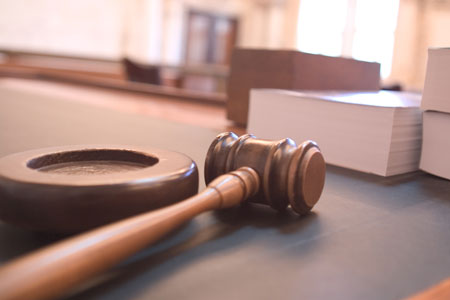'Not Guilty' Verdict In Super Bowl Bet Stabbing Incident
Comments (0)

(Creative Commons Licensed)
A 62-year-old man claiming self defense after he stabbed someone who owed him money on a Super Bowl bet was found not guilty of committing assault with a deadly weapon Wednesday, March 18.
Jurors found defendant Frank Hightower not guilty of stabbing fellow golfer Curtis Sazzman at Knollwood Country Club in Granada Hills on the evening of May 5, 2008. The trial at the San Fernando Courthouse lasted two days.
Jurors made their decision after listening to six witnesses testify against Hightower. The witnesses testified that he appeared to have stabbed Sazzman after the golfers engaged in an argument.Â
The prosecution's witnesses included Sazzman, the club's bartender and two regular golfers at the club who know Sazzman. Two police officers also testified and one showed the unfolded pocket knife from the stabbing found in a nearby ravine. Hightower testified Tuesday on his own behalf as the defense's only witness.
According to Sazzman, a regular customer and a former employee at the club, he and Hightower had a "friendly" conversation earlier in the afternoon. Sazzman said they agreed he would pay Hightower $50 he owed him from a Super Bowl bet after he finished his business meeting and had the chance to get money.
Sazzman testified that he left the club around 5 p.m. or 6 p.m. and went home shortly before heading to an ATM near the golf course. Â He said that when he reached his house, he heard a threatening message from Hightower on his home answering machine that stated, "I know where you live. I'm going to come get you."
Sazzman said that when he returned to the country club, he and Hightower started having a heated discussion at the bar.
Sazzman and Hightower continued their conversation in an empty banquet room nearby, where Sazzman said Hightower grabbed his shirt. Sazzman testified that he pushed back "just to get some space" and then Hightower stabbed his upper left arm.
"He walked over to me and lunged at me," Sazzman said, demonstrating as he brought his right fist forward in a thrusting motion.Â
Sazzman said he then found a towel to stop the bleeding, was taken to the hospital by a friend and received three or four stitches.Â
Questioned by Hightower's public defender, Christopher Sharpe, Sazzman said he believed the altercation lasted about five minutes. Sharpe reminded him that he had testified in a preliminary hearing that the event lasted 10 to 15 minutes, but Sazzman repeated his second estimated time.
Eric Sandifer, who described himself as an "acquaintance-friend" of Sazzman's who was at the country club that night, said he saw the men arguing in the bar. He testified that he followed them to the banquet room and witnessed the stabbing.Â
Sandifer said he followed Hightower after the stabbing as Hightower left the room, re-entered the bar, paid his tab, finished his drink, picked up his golf bag and then left the country club. Sandifer continued following Hightower outside, he said, and watched him throw an object into some bushes in a nearby ravine.Â
When Hightower took the stand he told a different version of the story. While he admitted that he stabbed Sazzman, he said it was in self defense.Â
Hightower said he did leave a message on Sazzman's phone that day, which included profanity and the statement, "I don't have time to wait. I've got to go."
He described Sazzman's demeanor as "upset" when he returned and the two left the bar to finish their conversation in the banquet room.Â
Hightower said that once he and Sazzman reached the banquet room, Sazzman pushed him repeatedly, even when he requested Sazzman stop. Hightower also said the witnesses were standing to his right and left and were in front of the room's only exit.Â
Hightower recalled Sazzman and Sandifer starting to move toward him. He demonstrated the way Sazzman approached him, bringing up his right fist from behind his back. It was then that he stabbed Sazzman out of fear that he had a weapon, Hightower said.
"Did you see one?" Sharpe asked him, referring to a weapon.
"No, but I wasn't waiting to find out," Hightower said.
Hightower's weapon was a pocket knife he usually used to clean his golf clubs and pull tees out of the ground. He also said he threw the knife in the bushes because he panicked.
"I had never done anything like this before," Hightower said. "If they had just let me out of that room, we wouldn't be here."
Hightower, an African-American man, said being confronted by the white men in the banquet room triggered a memory from his youth. He was 17 years old when he was beat up by white students for trying out for the football team at a predominantly white high school.
Sharpe argued that Hightower had stabbed Sazzman out of fear and only caused enough injury to defend himself.
He questioned the witnesses' reliability, emphasizing discrepancies in the men's testimonies, such as the timing of events and other small details. He also questioned their objectivity.
"These are not exactly unattached witnesses," Sharpe said. "They all know each other."
Deputy district attorney Sonia Govea said the case was about the defendant "going too far." She questioned Hightower's belief that he was in imminent danger since he also had known the men for a number of years and did not have any problems with them in the past.Â
After starting their deliberations on March 17, the jury reached a verdict of not guilty the next day.



